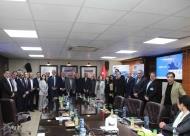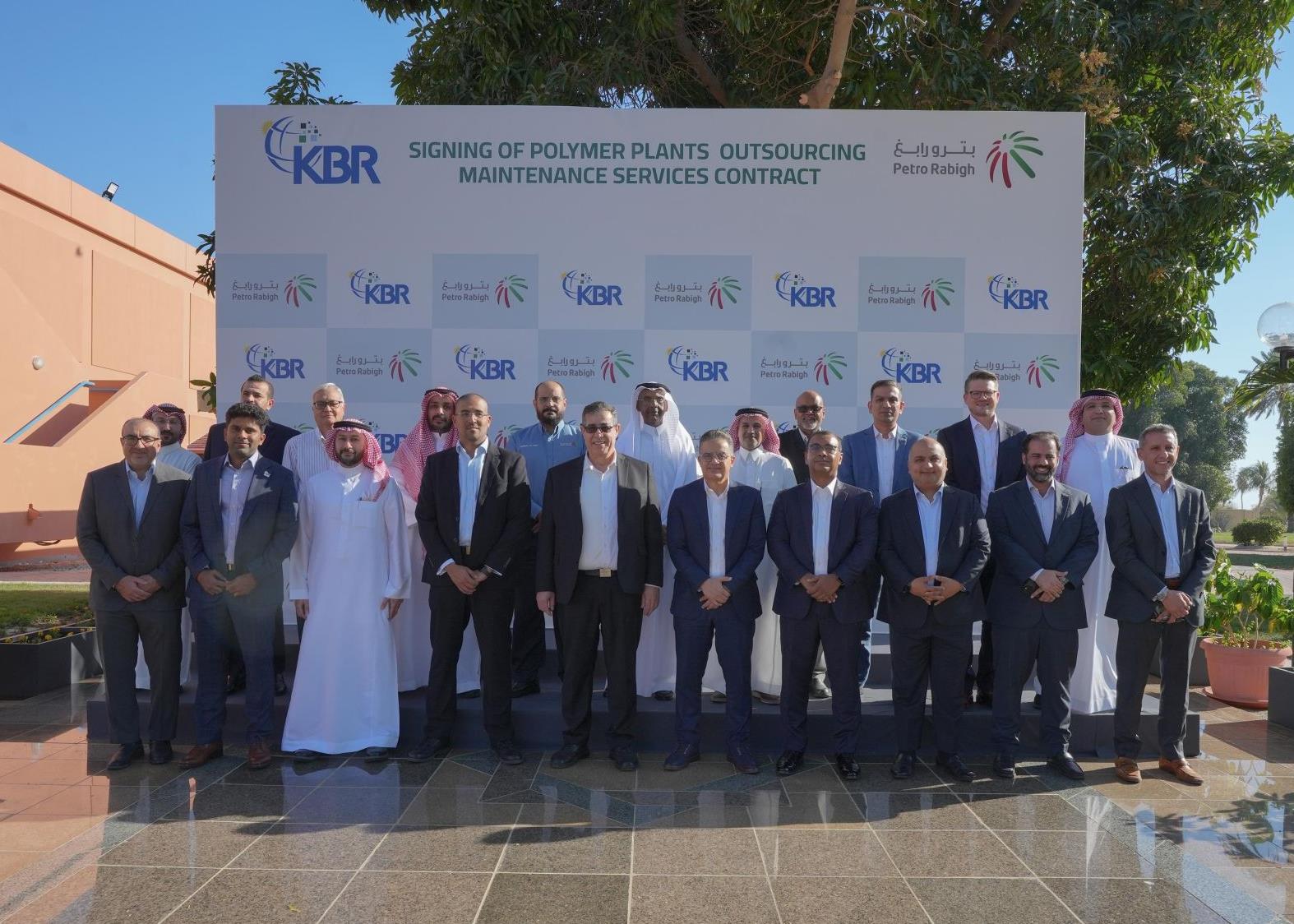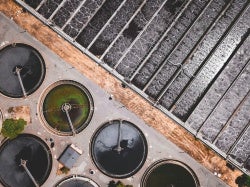GCC banks navigate Credit Suisse fallout
31 March 2023

Saudi National Bank chairman Ammar al-Khudairy’s abrupt resignation on 27 March capped a turbulent few weeks for the world’s financial system. This period saw the kingdom’s champion bank dragged into the harsh glare of the global spotlight and serious questions asked about Gulf financial institutions’ readiness to serve as props in an increasingly jumpy financial order.
A short sentence uttered in an interview by a senior Saudi banker precipitated the collapse of a 160-year-old institution. Ruling out extending beyond its 10 per cent stake as it would entail a higher capital cost led to the fellow Swiss bank UBS buying the troubled lender at a steep discount.
Al-Khudairy took the rap for what was deemed an avoidable crisis, in which SNB took a hosing: it bought the Credit Suisse stock at CHF3.82 ($4.2) a share; UBS has paid just CHF0.76 ($0.83) a share.
The pain goes wider than SNB and the Qatar Investment Authority (QIA), the other Gulf institution directly impacted by Credit Suisse’s troubles, given its 6.9 per cent stake in the lender.
The crisis poses serious questions about the role of wealthy Gulf institutions in a global system that is increasingly reliant on them, but has yet to stress test the relationship.
On the one hand, Gulf investors have been spooked about their exposure to venerable banking institutions that were once seen as copper-bottomed plays. Conversely, Western banks may now legitimately ask whether their Gulf counterparts are reliable partners in a crisis.
Volatile landscape
The backdrop is one of wider concern about the health of global financial markets. The Credit Suisse crisis was prefaced by US regulators shutting Silicon Valley Bank (SVB) on 10 March, following mass withdrawals of customer deposits.
For now, analysts caution against panic. First, SNB’s exposure – and that of other prominent Gulf lenders – appears limited.
“The impact of SNB’s investment in Credit Suisse and the subsequent takeover by UBS on SNB are limited because the initial investment represents less than 2 per cent of SNB’s investment portfolio and 70-80 bps of the bank’s risk-adjusted capital ratio,” says Mohamed Damak, senior director, Financial Institutions Ratings, at ratings agency S&P.
As to problems in the Western markets, again, exposures are manageable. “On average, banks we rate in GCC had exposure to the US of 4.6 per cent of assets and 2.3 per cent of liabilities at year-end 2022,” says Damak.
“Generally, GCC banks would have limited lending activity in the US and most of their assets there would be in high-credit quality instruments or with the Federal Reserve. The exposure to Europe tends to be limited as well, except for banks that have a presence in some European countries like France or the UK. Most of the activity in these jurisdictions tends to be linked to home countries or generally made of high-quality exposures.”
This will not end SNB shareholder anxiety that the bank’s raison d’etre – supporting domestic projects related to Vision 2030 – had been sidelined in the pursuit of equity positions in global blue chips.
Qatari contagion
Similar questions will be asked in Qatar, where the QIA provided ballast for the Swiss bank’s balance sheet in 2021, when it issued $2bn in convertible notes. The Qatari wealth fund will be reviewing its bank holdings and stress-testing its wider portfolio.
Others will do the same. “Gulf sovereign wealth funds will probably review their asset allocations, regardless of this current crisis,” one Gulf-based economist tells MEED. “The reality is that their role is changing. They were, in the past, more opportunistic investors. Today they are becoming strategic vehicles.”
If Gulf funds like QIA will no longer serve as the global financial system’s white knights – as they proved in the 2008 financial crisis – this may prompt a reconfiguration of investment strategies.
There will be a steep learning curve, says one Gulf-based economist – on both sides.
Governance implications
In light of the growing financial strength of the Gulf institutions come new responsibilities and governance requirements, reflecting the dawning reality that Gulf institutions are growing into increasingly globally systemically significant investors or sources of capital.
“They need to act accordingly,” says the economist. “Not just from the global governance perspective, but also from the perspective of protecting their assets.”
Gulf institutions’ transformation into opportunistic investors was well-timed when liquidity was required at short notice.
“The money centres of the world turned to one of the biggest honey pots they could identify. And, of course, some of the old reservations were conveniently parked aside, at least for the time being,” says the economist.
The challenge for the Gulf institutions was the lack of deep experience or institutional frameworks needed to underpin those initial investments.
“Opportunities arose, these countries chose to take them and they got lucky because they helped stabilise the global financial system, and they helped protect the reputation of these institutions. And no major mistakes were made. But that initial opportunistic approach will no longer fly,” says the economist.
Gulf sector outlook
The Credit Suisse saga has also prompted much ruminating in Western media to the extent that Western institutions may cast a more wary eye in future over their Gulf counterparts.
But absent new funding sources, the GCC's appeal may prove irresistible to them. After all, says the economist, beggars can’t be choosers.
“What is the alternative to resorting to institutions such as the Gulf sovereign funds? They’re not going to go to China, that’s for sure. The only real alternative is to get some sort of a backstop from national central banks. And that is pretty much as close as you can get to a moral hazard,” he says.
The broader global picture is evolving. How Gulf institutions related to primarily Western institutions will also be influenced by the change in the GCC states’ foreign policy.
Gulf governments are increasingly cognisant of the need for a balanced, multi-directional foreign policy. And that is something they will also want to reflect in their wealth funds and banks’ investment behaviour.
The next year should provide an insight into how the post-Credit Suisse modus vivendi will play out.
Exclusive from Meed
-
 SAR tenders phosphate rail project management deal
SAR tenders phosphate rail project management deal18 February 2026
-
 Veolia wins Jordan water services contract
Veolia wins Jordan water services contract18 February 2026
-
 PIF-backed firm signs worker accommodation deal
PIF-backed firm signs worker accommodation deal17 February 2026
-
 KBR wins 10-year maintenance contract from Petro Rabigh
KBR wins 10-year maintenance contract from Petro Rabigh17 February 2026
-
 Bidders await NWC decision on sewage contract
Bidders await NWC decision on sewage contract17 February 2026
All of this is only 1% of what MEED.com has to offer
Subscribe now and unlock all the 153,671 articles on MEED.com
- All the latest news, data, and market intelligence across MENA at your fingerprints
- First-hand updates and inside information on projects, clients and competitors that matter to you
- 20 years' archive of information, data, and news for you to access at your convenience
- Strategize to succeed and minimise risks with timely analysis of current and future market trends

Related Articles
-
 Veolia wins Jordan water services contract
Veolia wins Jordan water services contract18 February 2026
Register for MEED’s 14-day trial access
France's Veolia has signed a four-year performance-based management contract with the Water Authority of Jordan to support water and wastewater services in the country’s northern governorates.
Under the contract, Veolia will provide operations, maintenance and management services to Yarmouk Water Company, the public utility responsible for water supply and wastewater services in the region.
The agreement covers Irbid, Jerash, Ajloun and Mafraq, an area spanning nearly 30,000 square kilometres and covering about 3 million people.
The scope includes water and wastewater operations, maintenance, billing and collection, and customer service.
According to the firm, the performance-based structure prioritises measurable improvements, including service delivery, cost efficiency and revenue management.
The company said it will deploy technical and management specialists to support operations, rehabilitation works and investment initiatives.
The contract builds on Veolia’s existing operational role in Jordan’s water sector. The company operates the Disi-Amman scheme, which supplies about 100 million cubic metres of drinking water a year, under an operations and maintenance contract.
It also operates the Al-Samra wastewater treatment plant, which produces about 133 million cubic metres of treated wastewater annually for agricultural reuse.
https://image.digitalinsightresearch.in/uploads/NewsArticle/15684109/main0535.jpg -
 SAR tenders phosphate rail project management deal
SAR tenders phosphate rail project management deal18 February 2026

Register for MEED’s 14-day trial access
Saudi Arabian Railways (SAR) has floated another tender inviting firms to bid for a contract covering the project management consultancy services for its Phosphate 3 rail programme.
The tender was issued on 15 February with a bid submission deadline of 5 April.
The contract duration is 54 months.
The latest tender follows SAR floating a multibillion-riyal tender to double the tracks on the existing phosphate transport railway network connecting the Waad Al-Shamal mines to Ras Al-Khair in the kingdom’s Eastern Province.
The tender – covering the second section of the track-doubling works, spanning more than 150 kilometres (km) – was issued on 9 February. The bid submission deadline is 15 April.
Earlier this month, MEED reported that SAR received bids from contractors on 1 February for the project’s first phase, which spans about 100km from the AZ1/Nariyah Yard to Ras Al-Khair.
The scope includes track doubling, alignment modifications, new utility bridges, culvert widening and hydrological structures, as well as the conversion of the AZ1 siding into a mainline track.
The scope also covers support for signalling and telecommunications systems.
The tender notice was issued in late November with a bid submission deadline of 20 January.
Switzerland-based engineering firm ARX is the project consultant.
MEED understands that SAR is expected to tender a total of four packages for the phosphate railway line.
The other packages expected to be tendered shortly include the depot and the systems package.
In 2023, MEED reported that SAR was planning two projects to increase its freight capacity, including an estimated SR4.2bn ($1.1bn) project to install a second track along the North Train freight line and construct three new freight yards.
Formerly known as the North-South Railway, the North Train is a 1,550km-long freight line running from the phosphate and bauxite mines in the far north of the kingdom to the Al-Baithah junction. There, it diverges into a line southwards to Riyadh and a second line running east to downstream fertiliser production and alumina refining facilities at Ras Al-Khair on the Gulf coast.
Adding a second track and the freight yards will significantly increase the network’s cargo-carrying capacity and facilitate increased industrial production. Project implementation is expected to take four years.
State-owned SAR is also considering increasing the localisation of railway materials and equipment, including the construction of a cement sleeper manufacturing facility.
https://image.digitalinsightresearch.in/uploads/NewsArticle/15684025/main.jpg -
 PIF-backed firm signs worker accommodation deal
PIF-backed firm signs worker accommodation deal17 February 2026
Register for MEED’s 14-day trial access
Saudi Arabia's Smart Accommodation for Residential Complexes Company (Sarcc) has signed an agreement with Riyadh-based Mawref Company to develop a 12,000-bed worker accommodation project in North Riyadh.
The project will cover about 120,000 square metres (sq m), with a total built-up area of 150,000 sq m.
The development is expected to cost over SR669m ($178m), with the first phase slated for completion in 2029.
Sarcc is backed by the Public Investment Fund (PIF), the Saudi sovereign wealth vehicle.
The agreement follows Sarcc signing another agreement in September last year with privately-owned local firm Tamimi Global Company to explore collaboration in developing worker accommodation facilities in the kingdom.
The PIF launched Sarcc in October 2024 with the aim of developing and operating staff housing and accommodation assets in the kingdom.
Sarcc will develop and operate the staff accommodation facilities at major construction projects in Saudi Arabia.
The company will seek opportunities to invest in the sector to strengthen staff housing standards. Sarcc will also look to engage the private sector by enabling investment and partnership opportunities in sectors including construction, catering, transportation and retail.
https://image.digitalinsightresearch.in/uploads/NewsArticle/15672262/main.gif -
 KBR wins 10-year maintenance contract from Petro Rabigh
KBR wins 10-year maintenance contract from Petro Rabigh17 February 2026
Register for MEED’s 14-day trial access
Saudi Arabia's Rabigh Refining & Petrochemical Company (Petro Rabigh) has awarded US-based consultant KBR a 10-year contract to provide maintenance services covering the company’s polymer plants in Rabigh, on the kingdom’s Red Sea coast.
“This [contract award] marks a major step in Petro Rabigh’s transformation journey, supporting safer operations, stronger reliability and long-term improvement across its facilities,” Petro Rabigh said in , without providing further details.
Work on the operations and maintenance contract will be executed by KBR’s business line, which operates under the Houston-headquartered firm’s Technology Solutions portfolio, sources told MEED.
Prior to this contract, in March 2024, Petro Rabigh awarded KBR a similar five-year asset condition monitoring programme contract. As part of that job, KBR is to provide predictive maintenance services at Petro Rabigh’s main plant.
Petro Rabigh was originally established in 1989 as a basic topping refinery with crude oil processing facilities, located in Rabigh, 165 kilometres to the north of Jeddah in Mecca Province.
Saudi Aramco and Japan’s Sumitomo Chemical Company formed an equal joint venture in 2005 to transform the Petro Rabigh crude oil refining complex into an integrated refinery and petrochemicals complex, with the strategic objective of expanding Saudi Arabia’s annual production capacity of refined products and petrochemicals.
Three years after the creation of the Petro Rabigh joint venture, the partners floated 25% of its shares in an initial public offering on the Saudi Stock Exchange (Tadawul) in 2008, following which Aramco and Sumitomo Chemical each held 37.5% shares in Petro Rabigh, with the remaining shares listing on the Tadawul.
In October last year, however, Aramco completed the acquisition of an additional 22.5% stake in Petro Rabigh from Sumitomo Chemical. Following the completion of the transaction, valued at $702m or SR7 a share, Aramco became the majority shareholder in Petro Rabigh, with an equity stake of 60%, while Sumitomo retains an interest of 15%. The remaining 25% shares of Petro Rabigh continue to trade on the Tadawul.
ALSO READ: Petro Rabigh and Indian firm to study joint project investment
Following the formation of the Petro Rabigh joint venture in 2005, Aramco and Sumitomo Chemical launched the expansion of the refining facility into an integrated refining and petrochemicals complex in 2006, investing $9.8bn in the project, 60% of which was secured through external financing. Engineering, procurement and construction works on phase one were completed in 2009, with the integrated downstream complex entering operations in November of that year.
The Petro Rabigh downstream complex consists of a topping refinery that has a 340,000 barrel-a-day (b/d) crude distillation unit, a 47,000 b/d hydrotreater, a 12 million cubic-feet-a-day hydrogen plant, a 75,000 b/d naphtha merox unit and a 60,000 b/d kerosene merox unit, along with supporting utilities, product tankage and a marine terminal.
Aramco and Sumitomo Chemical initiated Petro Rabigh’s phase two expansion project, valued at $8bn, in 2014. The second expansion phase was commissioned in 2018 and added 15 chemicals plants to the Petro Rabigh complex, raising the facility’s total production capacity to 18.4 million tonnes a year (t/y) of petroleum-based products.
The expansion also increased Petro Rabigh’s capacity to process an additional 30 million cubic feet a year of ethane into 2.4 million t/y of ethylene and propylene-based derivatives, and achieved a naphtha output of 3 million t/y.
Expansion of the main existing chemicals plant and the establishment of a clean fuels complex comprising polyether polyols, naphtha treating and sulphur recovery units were also part of the phase two project.
Photo credit: Petro Rabigh on LinkedIn
https://image.digitalinsightresearch.in/uploads/NewsArticle/15670196/main5008.jpg -
 Bidders await NWC decision on sewage contract
Bidders await NWC decision on sewage contract17 February 2026

Saudi Arabia’s National Water Company (NWC) is evaluating five bids for package 12 of its long-term operations and maintenance (LTOM12) sewage treatment programme.
Known as the North Western B Cluster, LTOM12 forms part of the second phase of NWC’s rehabilitation of sewage treatment plants programme.
The contract covers the construction and upgrade of seven sewage treatment plants with a combined capacity of about 162,000 cubic metres a day (cm/d).
As MEED understands, the companies that have submitted proposals include:
- Alkhorayef Water & Power Technologies (Saudi Arabia)
- Civil Works Company (Saudi Arabia)
- Miahona (Saudi Arabia)
- Beijing Enterprises Water Group – BEWG (Hong Kong)
- Al-Yamama (Saudi Arabia)
Earlier this month, MEED exclusively reported that six contractors are competing for the North Western A Cluster Sewage Treatment Plants Package 11 (LTOM11), which has an estimated value of about $211m.
The project involves the construction and upgrade of two sewage treatment plants with a combined capacity of about 440,000 cm/d.
The scheme is being procured on an engineering, procurement and construction (EPC) basis with a long-term operations component.
It is understood that contracts for LTOM11 and LTOM12 will be awarded in May.
In January, a consortium of United Water (China), Prosus Energy (UAE) and Armada Holding (Saudi Arabia) won the main contract for the Northern Cluster Sewage Treatment Plants Package 10 (LTOM10).
This contract was the first to be awarded under the second phase of NWC’s rehabilitation of sewage treatment plants programme.
NWC previously awarded $2.7bn-worth of contracts for the first phase of its LTOM programme. This comprises nine packages covering the treatment of 4.6 million cm/d of sewage water for the next 15 years.
https://image.digitalinsightresearch.in/uploads/NewsArticle/15670141/main.jpg


